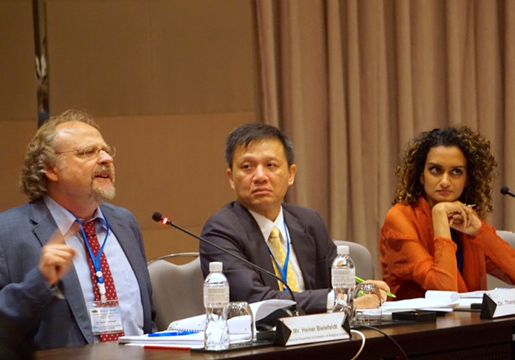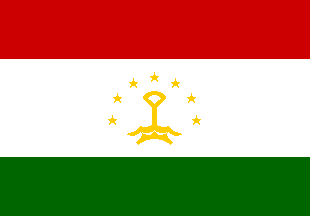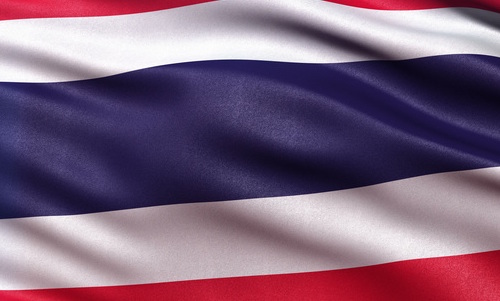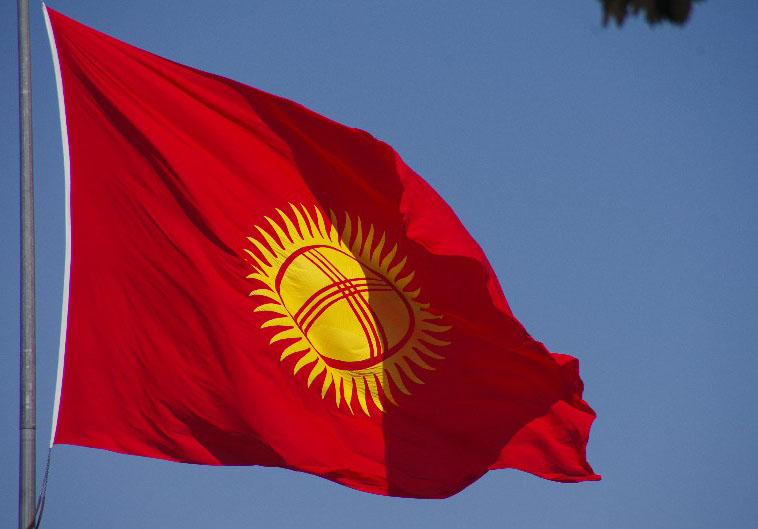
Oct 1, 2015 | News
At a two-day conference held in Bangkok, and first of its kind, committed to working to enhance the right to Freedom of Religion or Belief in Southeast Asia.
For the first time, approximately 70 human rights defenders, members of religious groups, rights groups, UN agencies and representatives from the ASEAN Intergovernmental Commission on Human Rights, ASEAN Commission on the Promotion and Protection of Rights of Women and Children, National Human Rights Institutions and other government agencies from across the region gathered together to discuss key pressing concerns regarding the right to freedom of religion or belief in Southeast Asia with the UN Special Rapporteur on Freedom on Religion or Belief, Heiner Bielefeldt.
The event was co-organized by the Asian Forum for Human Rights and Development (FORUM-ASIA), the ICJ, and Boat People SOS (BPSOS) from 30 September to 1 October 2015 in Bangkok, Thailand.
During the event, participants were able to deepen their understanding on the right to freedom of religion or belief under international law and standards, and how religious freedom and other human rights should be interpreted and applied in a complementary manner.
“Many people suffer complex violations of their human rights, for example in the intersection of religious minority status, ethnicity, gender, sexual orientation or indigenous origin,” said Heiner Bielefeldt.
The two-day conference also successfully provided a multi-stakeholder platform for the participants to share challenges and best practices, as well as brainstorm ideas on addressing violations related to state control and regulation of religion, and extreme interpretations of religion.
“The politicization of religion undermines freedom of religion or belief, not only to the detriment of minorities, but also of followers of majority religions who do not wish to see their faith be turned into a tool of political power gambling,” added the Special Rapporteur.
Notable suggestions raised by the group on addressing identified obstacles to the free practice of religion or belief included the need for reforms, such as the repeal of blasphemy laws and mandatory registrations, and the importance of dialogue between groups of the same faith, as well as those of different religions.
“We need more cooperation across boundaries, including between faith-based and secular civil society organization,” stressed the expert.
Participants at the conference also recognized the opportunity presented before them in advancing freedom of religion or belief in the region and committed to working to enhance this right by reaffirming:
- Article 18 of the Universal Declaration of Human Rights, which declares: “Everyone has the right to freedom of thought, conscience and religion; this right includes freedom to change his religion or belief, and freedom, either alone or in community with others and in public or private, to manifest his religion or belief in teaching, practice, worship and observance.”
- Freedom of religion or belief is an inalienable, non-derogable human right, encompassing the right to hold or not to hold any faith or belief, to change belief, and to be free from coercion and to manifest religion or belief.
- For freedom of religion or belief to be fully enjoyed, other human rights must also be respected, particularly the principle of nondiscrimination and freedoms of expression, assembly, association, education, and movement.
The participants also committed to:
- Defend and promote freedom of religion or belief as a universal, inalienable and non-derogable human right, as set out in the Universal Declaration, in international law and declarations, and in the work of national, regional, and global institutions.
- Defend and promote freedom of religion or belief for all persons, as individuals and in community with others, through their work and respective institutions by sharing information and mobilizing effective responses.
- Work toward the nondiscriminatory realization of freedom of religion or belief in recognition of multiple and intersectional discriminations and vulnerabilities, including, among other grounds, on grounds of ethnicity, indigenous identity, gender, sexual orientation, citizenship, and disabilities.
- Enhance global and regional cooperation by working across geographical, national, racial, ethnic, political and religious boundaries.
- Advocate for accountability and remedies for individuals and communities suffering from violence, persecution, discrimination, harassment, marginalization or other abuses of human rights because of their religion or belief.
- Express and act in solidarity with individuals and communities suffering from violence, persecution, discrimination, harassment, marginalization or other abuses of human rights because of their religion or belief.
The Conference Declaration was based on the Charter for Freedom of Religion or Belief and the New York Resolution for Freedom of Religion or Belief of the International Panel of Parliaments for Freedom of Religion or Belief (IPPFORB).
South East Asia-Decla Freedom of religion-Advocacy-2016-ENG (full Declaration, in PDF)

Oct 1, 2015 | News
The ICJ is alarmed at the arrest of Buzurgmehr Yorov, a lawyer practicing in Tajikistan.
Mr Yorov’s arrest may be related to his representation of thirteen leaders of the Islamic Renaissance Party of Tajikistan (IRPT).
This is the third recent case of arrest of a lawyer in Tajikistan, and this pattern of arrests raises serious concerns for protection of human rights and compliance with international standards on the role of lawyers.
On 28 September, at 10.00, police officers appeared at the “Sipar” Collegia of lawyers, which is headed by Buzurgmehr Yorov, and seized documents related to the case of the members of the IRPT who Mr Yorov represents. At around 14.00, other police officers apprehended the lawyer at his office, claiming he needed to answer certain questions. The lawyer later made a phone call to say that he had been arrested and detained.
On 29 September, the Ministry of Interior of Tajikistan, in its Press Release, said that Buzurgmehr Yorov “by way of fraud” appropriated “a large amount of money”.
According to the Ministry of the Interior, a resident of Istaravshan named Komiljhon Bozorov paid USD 4000 to help with the case of his son, who was charged with an attempted murder. Mr Bozorov is reported to claim that the lawyer failed to provide legal aid and “abused his trust and his difficult situation”.
Mr Yorov is also charged with forging documents about the technical condition of a car.
The ICJ fears that the decision to arrest lawyer Buzurgmehr Yorov was in fact connected with his representation of members of the IRPT.
The ICJ recalls that according to the UN Basic Principles on the Role of Lawyers, “Lawyers shall not be identified with their clients or their clients’ causes as a result of discharging their functions”; they must be able “to perform all their profession functions without intimidation, hindrance, harassment or improper interference”; and lawyers “shall not suffer, or be threatened with, prosecution or administrative, economic or other sanctions for any action taken in accordance with recognized professional duties, standards or ethics”.
The ICJ’s concerns in this case are based in part on the particularly worrying pattern of arrests of lawyers , who represent clients in “high profile” cases, that has emerged in the recent past in the Republic of Tajikistan.
It should be recalled that it is lawyers’ role to defend persons charged with alleged crimes. The justice system cannot function in accordance with international standards if lawyers are not able to represent their clients’ interests.
For the right to a fair trial as guaranteed under international human rights law to be protected, defendants must have access to a lawyer who can represent their interests effectively, without harassment or interference.
The ICJ calls on the authorities of Tajikistan to ensure that all lawyers are able to conduct their work without fear of threats or harassment, including arbitrary arrest or prosecution.
It calls on the investigating authorities to ensure that Burzurgmehr Yorov is not prosecuted as a means of harassment or reprisal for his representation of a client, and that any proceedings against him are conducted in accordance with international human rights law, including the right to a fair hearing, and taking into account international standards on the role of lawyers.
Whether or not his arrest is in reality based on his representation of IRPT, or on the basis of the allegations of fraud, Mr Yorov should be immediately released.
Even if the arrest was in fact based on the allegations of fraud, the ICJ is unaware of any evidence or reasons in Mr Yorov’s case that would justify his continued pre-trial detention, under international standards on the right to liberty and the prohibition of arbitrary arrest and detention.
Background information:
Thirteen persons, represented by Burzurgmehr Yorov, were arrested on 16-17 September 2015, following armed attacks earlier this year in Dushanbe and Vakhdat.
Members of the group are accused of “establishment of a criminal community/organization in order to commit grave or particularly grave crimes”, as foreseen under Article 187(1) of the Criminal Code of the Republic of Tajikistan.
The arrest and detention of Mr Yorov is the third case in the last two years of prosecution of a lawyer representing clients in a high profile case in Tajikistan. On 13 January 2015, lawyer Shukhrat Kudratov was convicted to 9 years in prison on charges of fraud and bribery.
In 2014, another lawyer, Fakhriddin Zokirov, was arrested and tried on charges of fraud in banking transactions. He was released as a part of an act of amnesty in November 2014.
Tajikistan-Lawyer Yorov statement-News-web stories-2015-RUS (full text in Russian, PDF)
For further infromation see previous ICJ statements:
Tajikistan: ICJ concerned at conviction of lawyer Shukhrat Kudratov
Tajikistan: Arrest of lawzer is a threat to the independence of the profession

Sep 29, 2015 | Events, News
From 30 September to 1 October 2015, the Asian Forum for Human Rights and Development (FORUM-ASIA), International Commission of Jurists (ICJ), and Boat People SOS (BPSOS) will jointly organize a conference in Bangkok.
The regional conference will discuss pressing concerns on the promotion and protection of freedom of religion or belief.
The UN Special Rapporteur on Freedom on Religion or Belief, Mr. Heiner Bielefeldt, will be joined by approximately 60-70 human rights defenders, members of religious groups, rights groups, UN agencies and representatives from the ASEAN Intergovernmental Commission on Human Rights, ASEAN Commission on the Promotion and Protection of Rights of Women and Children, National Human Rights Institutions and other government agencies.
The event will provide a multi-stakeholder platform to discuss key emerging issues, distinct and shared challenges faced by various Southeast Asian religious groups and advocates of religious freedom, identify advocacy strategies and best practices to overcome these obstacles, and to strengthen cooperation between the different stakeholders important in promoting freedom of religion or belief in Southeast Asia.
The event will also be an opportunity for participants to have a better understanding of the mandate of the UN Special Rapporteur on freedom of religion or belief.
Some of the key topics expected to be discussed include state control and regulation of religion, extreme interpretations of religion, and how freedom of religion together with other human rights are complementary or mutually reinforcing.
Upon the completion of the conference, the Special Rapporteur will hold a press briefing at the Foreign Correspondents’ Club of Thailand (FCCT) at 7.30pm on 1 October 2015 to provide an overview of the status of freedom of religion or belief in Southeast Asia and how this right could be better protected and promoted.

Sep 24, 2015 | News
The ICJ and ten other civil society organizations are concerned about the possible refoulement by the Cambodian government of more than 100 Montagnard asylum seekers to Viet Nam and call on Cambodia not to take such action.
They issued a statement that can be downloaded here:
Cambodia-Refoulement of Montagnard asylum seekers-News-web story-2015-ENG (full text in PDF)

Sep 21, 2015 | News
Today, the ICJ has started its mission to the Kyrgyz Republic on organisation and functioning of the legal profession.
During the mission, which will last from 21 to 25 September, the ICJ will assess the implementation of the new legislation unifying the legal profession under a single national bar association, including establishment of new structures and standards for the self-governance of the profession regarding qualification, disciplinary action and professional ethics.
A round table with independent lawyers will be held during the visit, other meetings with bodies of the Bar Association, State officials and other stakeholders that take part in the reform will be held.
The mission will include Jeroen Brouwer, former President of the Dutch Bar Association, Róisín Pillay, Director of the Europe Programme and Temur Shakirov, Legal Adviser of the Europe Programme.
The mission will be followed by a brief report with recommendations for reform.
Contact:
Róisín Pillay: roisin.pillay(a)icj.org
Temur Shakirov: temur.shakirov(a)icj.org

Sep 16, 2015 | News
Myanmar’s government must end the practice of appointing newly retired military officials as judicial officers to its courts and ensure that the judiciary carries out its functions as a separate branch and independent of the Executive, said the ICJ today.
At least 20 former military officers who have just recently resigned from the military were reportedly appointed as vice director generals to the country’s Supreme Court this month.
They will be performing administrative functions but according to section 310 of the Myanmar Constitution will be in line for senior judicial appointments at the state or regional level after 5 years or sooner if the President considers them to be ‘eminent jurists’.
“One of the fundamental aspects of an independent, impartial and accountable judiciary is the appointment of judges, through proper procedures, on the basis of their legal competencies,” said Sam Zarifi, ICJ’s Asia Director. “The process for appointing and promoting judges must be transparent and ensure judicial independence and impartiality.”
A group of leading members of the Myanmar bar launched a “yellow ribbon” campaign last Friday in Yangon to protest the practice of assigning military officers to serve as judicial officers.
“The process of selecting these officers and assessing their legal qualifications is totally opaque,” Zarifi added. “The lawyers wearing yellow ribbons are emphasizing the belief of people in Myanmar that strengthening the rule of law is essential to guaranteeing justice and the country’s political and economic development, so it’s important to improve the judiciary’s qualifications and increase public trust.”
The Supreme Court of Myanmar launched its Strategic Plan 2015-2016, citing “judicial independence and accountability” as one of its key strategy areas.
The UN Basic Principles on the Independence of the Judiciary provide that that “Persons selected for judicial office shall be individuals of integrity and ability with appropriate training or qualifications in law.”
“The Myanmar judiciary is trying to shake off decades of interference from the Executive branch in order to assert its proper role as defender of the rights of people in Myanmar, and it can’t do so without a clear and transparent appointment and promotion process,” Zarifi said.
An exposition and analysis of international law and standards are available in English and Myanmar language in the ICJ’s authoritative Practitioners’ Guide on the Independence and Accountability of Judges, Lawyers and Prosecutors.
Contact:
Sam Zarifi, ICJ Regional Director for Asia and the Pacific, t: +66 807819002; e: sam.zarifi(a)icj.org
Vani Sathisan, ICJ International Legal Adviser for Myanmar, t: +95 9250800301; e: vani.sathisan(a)icj.org










